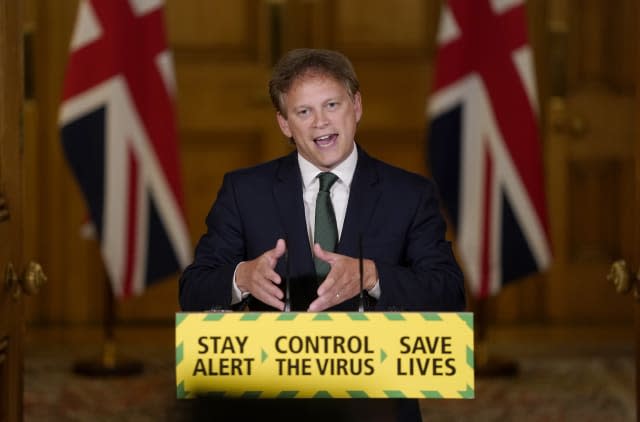Normality by Christmas dependent on how ‘alert’ people are, minister says

It is possible to deliver a return to normality by Christmas, but it depends on how people respond and how “alert” they are, a minister has said.
Transport Secretary Grant Shapps told BBC Breakfast on Saturday that further plans to lift lockdown restrictions gave people a sense of direction and hope.
His comments come after leading scientists warned that Prime Minister Boris Johnson may struggle to deliver his vision of a “significant return to normality” in time for Christmas.
The Prime Minister signalled another significant easing of coronavirus lockdown restrictions in England on Friday, relaxing work-from-home guidance and paving the way for theatres and sports stadiums to reopen.
When asked how optimistic he was about a return to normality by Christmas, Mr Shapps said he thought it was “possible that we can get there”.
He added: “It’s giving people a road map, really, so we can give people some hope whilst planning for the worst as well.
“We want to give people some sense of direction, because a lot of people are running businesses or rely on the Christmas period and need to know that if everything goes well that this is our intention.
“But you can’t get away from the fact that the virus is still, in many ways, a bit of an unknown, and of course it depends how millions of people respond and how good and alert we are in terms of all the things we know, like washing your hands and for the time being keeping that social distance of one metre-plus.”
At a No 10 press conference on Friday Mr Johnson said it was his “strong and sincere hope” that ministers would be able to review the remaining restrictions from November onwards, “possibly in time for Christmas”.

However, Professor John Edmunds, a member of the Government’s Scientific Advisory Group for Emergencies (Sage), said a return to pre-lockdown normality is “a long way off”.
He told the BBC Radio 4 Today programme: “If what you mean by normality is what we used to do until February and the middle of March this year – go to work normally, travel on the buses and trains, go on holiday without restrictions, meet friends, shake hands, hug each other and so on – that’s a long way off, unfortunately.
“We won’t be able to do that until we are immune to the virus, which means until we have a vaccine that is proven safe and effective.
“If we return to those sort of normal behaviours the virus will come back very fast.”
His comments echoed the chief medical officer for England, Professor Chris Whitty who warned measures such as hand-washing, isolation and household quarantine would be needed for a “prolonged period”.
In his address, the Prime Minister said it will be up to employers in England to discuss with workers whether it is safe to return from August 1.
Mr Shapps said employers need to make sure workplaces are Covid-safe for employees to return to work.
He added: “We absolutely expect and ask employers and employees to work sensibly together, there’s full employee protection in place.
“The Heath and Safety Executive would certainly have something to say if they are not using all of the guidelines.”
From next month, most remaining leisure centres will reopen and indoor performances with live audiences can resume if pilots are successful, while trials will begin for sports stadiums to reopen from October.
Mr Johnson also immediately scrapped the advice to avoid public transport.
It means that from next month, wedding receptions for up to 30 people can resume, and bowling lanes, skating rinks, casinos and beauticians can reopen as long as they have measures in place to reduce Covid-19 transmission.

Pilots to reopen sports stadiums will include the World Snooker Championship in Sheffield from July 31 and the Glorious Goodwood horse racing festival from August 1.
In an attempt to prevent another nationwide shutdown, Mr Johnson said local authorities in England will have new powers from Saturday to close specific premises, shut outdoor spaces and cancel events.
Ministers will also be able to close entire sectors or types of premises in an area and issue “stay at home” orders, Mr Johnson said.
He also set out his plans to prepare the NHS for a potential second spike in Covid-19 cases coinciding with the flu season this winter, saying the nation must be “hoping for the best, but planning for the worst”.
An extra £3 billion funding for the NHS in England, and extra money for the devolved nations, will allow Nightingale hospitals to remain open and for private hospital capacity to be used until the end of March.


